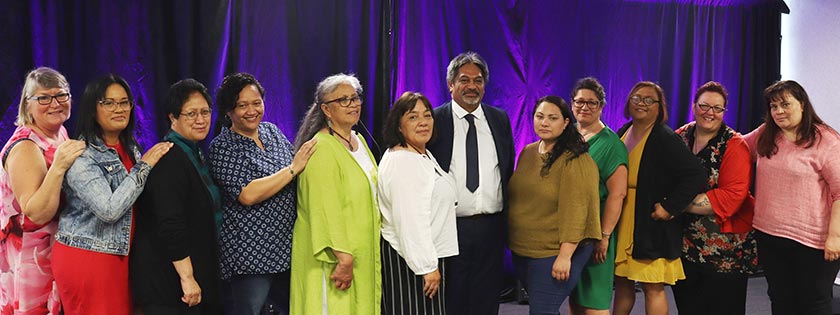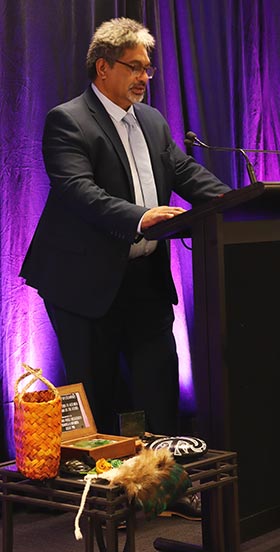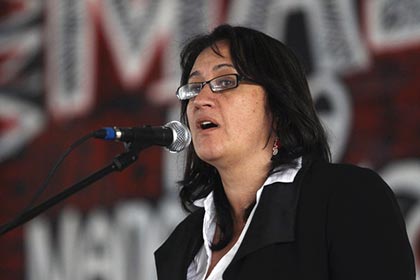
Mihi
Nō Airani, Ingārani, me Kōtirani ōku tūpuna. E noho ana au i te takiwā o Te Ātiawa me Ngāti Toa Rangatira. He kaitautoko whakapā o Tōpūtanga Tapuhi Kaitiaki o Aotearoa. Kō Hugo Robinson tōku ingoa.
My name is Hugo Robinson and I am the communications and media assistant at NZNO. I was honoured to attend the recent Indigenous Nurses Aotearoa Conference (INAC) and write about this experience. This article contains my reflections on the conference, and, given that I am neither Māori nor a nurse, I can only comment on things that resonated with me. However, I have tried my best to give a sense of the power of the kōrero, the context from which the speakers were coming, and the intentions with which te poari organised the conference.
Ngā mihi mahana ki ngā tāpuhi Māori o ngā mōtu me ngā kaikōrero hoki. It was a privilege to listen and I look forward to continuing to tautoko you in all ways I can. Nō reira, tēnā koutou katoa.
Introduction
The power
Of thousands of years
In her cycles of blood,
And
The rhythms of her heart
She descends from the seeds of Rangiātea
The never ending source of who we are who we can be
Don’t mess with the Māori woman
Who stands beside you
As she walks with the power
Of thousands of years
In her blood and her bones
– Excerpt from Linda Tuhiwai Smith’s poem, Don’t Mess with the Māori Woman
On November 26 and 27 Te Rūnanga o Tōpūtanga Tapuhi Kaitiaki o Aotearoa New Zealand Nurses Organisation held its first virtual INAC. After many tense, anxiety-filled months for tāpuhi Māori on the frontlines of COVID-19, as well as dealing with the ongoing issues of systemic racism and pay parity for those working for Māori and iwi providers, the conference aimed to give the space and time to re-energise the collective mauri for Te Rūnanga. These were two days filled with joy and sadness – days for reflection, remembrance and planning.
Yet, one of the big challenges in our changing world – as with the NZNO annual general meeting and conference – was the absence of the kanohi-ki -te-kanohi connections noted by many speakers. Nevertheless, it was a deeply stirring hui which, while being separated by technology, was filled with inspiring kōrero from speakers around Aotearoa New Zealand and beyond.
The kaupapa for the year had two components: “Raising an Army of Nurses” and “Rise Up”. The first – which was also the previous year’s kaupapa – references Māori statesman Sir Apirana Ngata. Seeing how epidemics in earlier times devastated Māori, and the lack of state response, Ngata urged the drastic need for more Māori nurses to go out and treat their people.
It was, therefore, very fitting that the same words be carried over to this year, a year in which Māori health-care workers mobilised to fill the gaps in the Government’s COVID-19 response for Māori. Their self-organisation and assertion of mana was crucial for the health of their communities.
The second component of this year’s kaupapa, the call to “Rise Up”, references Andra Day’s inspiring song of the same name, as well as Maya Angelou’s poem, “Still I Rise”, the opening lines of which read:
You may write me down in history
With your bitter, twisted lies,
You may tread me in the very dirt
But still, like dust, I’ll rise.
Both the poem and song were played at the beginning of each day, accompanied by karakia and photos of Māori struggles for justice through the years. These opening moments were immensely moving as they took stock of the whakapapa of struggle that Māori nurses are part of. They encapsulated the significance of the kaupapa because they conveyed just some of the tireless mahi to not just work in the system, but to actively try to change it.
In this article, I focus on the kōrero that I could connect with most and feel most comfortable sharing. I also want to mihi to Tracey Haddon, Sue Crengle, Dr Anne-Marie Baker and Merryn Jones, who I could not include in this piece, but whose kōrero was thought-provoking, whānau-focused and full of critical insight which I have not the experience or knowledge to discuss adequately. I hope to co-write a piece on their kōrero at a later stage.
Tina Wilson-Hall
Tina Wilson-Hall (Ngāti Tukorehe, Ngāti Raukawa, Muaupoko, Rangitāne, Ngāi Tahu), the tumu whakarae for Māori Partnerships and Capability at New Zealand Trade and Enterprise (NZTE), spoke on the impacts of the pandemic on the worlds of business and health. She drew on the whakataukī, “Ko te pae tawhiti whaia kia tata, ko te pae tata whakamaua kia tina.” Seek to bring distant horizons closer, and sustain and cherish those that have been arrived at.
True to the whakataukī, Tina’s kōrero was incredibly interesting because it brought home the interconnectedness of the global and local world and that, in spite of that, our priorities are clear. At the outset of her kōrero, she showed a slide of Tukorehe Marae. “This is my marae,” she said, “and when the world changed it became apparent that this was all we really, really cared about.”
She addressed some of NZTE’s primary concerns about how decreased exports and tourism affected Māori. She spoke about how Aotearoa New Zealand used to send 270 flights a day filled with exports. After COVID-19 hit, that was reduced to three a day. That was why the marae was so important. It was where people mobilised to respond and support one another. And, she said, “It was so phenomenal to see what we can do when we need to.”
The key takeaway for me was how deeply the economy and people’s health are interconnected. Echoing many of the speakers’ whakaaro, her kōrero made it clear that relying on international trade and commerce can leave communities vulnerable when that link is broken. Self-determination for tāngata whenua is therefore crucial to protect against the crises that global capitalism amplifies for already marginalised communities.
COVID-19 experiences from the indigenous view
Following Tina, was a panel on the impacts of COVID-19 on nurses in Aotearoa New Zealand and te Moananui-a-Kiwa (the Pacific). Each kaikōrero brought a unique perspective which showed how far-reaching the impacts of the virus have been, the significance of which can often get lost.
Kate Brown (Ngāiterangi) raised crucial concerns about the role of ecological sustainability in protecting against future pandemics. This was in light of the suggestion made recently that ecological collapse is potentially linked to the spill-over of zoonotic diseases. Whether or not there is a causal link, balance must be struck and we must learn from the past and change how we do things. This is all the more pressing, Kate said, with the likelihood of recurring pandemics ahead.

She described how a month after the first case of measles in September 2019, the Samoan government declared a state of emergency. Schools were closed, children under 17 were not allowed to be in public gatherings, self-isolation was promoted and vaccination was mandatory. Moreover, through public health education, they were able to turn around a generally distrusting public to have faith in their health-care system.
Following Henri, Tina Black’s (Te Whānau ā Apanui) kōrero reiterated that a mana motuhake response was the only appropriate one for hapū and iwi. Self-organisation was the most important factor and her message was to “know your community and plan for them, get prepared for self-sustainability”. Given the criticism Te Whānau ā Apanui received for their roadblocks initiative during the lockdown, this principle demonstrates the hypocrisy of those who called iwi roadblocks “separatism” while ignoring the fact that nobody else was coming in to help hapū and iwi prepare.
Charleen Waddell’s (Rongomaiwahine, Kati Mamoe, Kai Tahu, Ngāti Kahangunu) experience similarly highlighted the need for Māori nurses to organise and be adaptable to changing circumstances. She spoke of their extraordinary team who remained in Bluff, Southland, to ensure the community was safe, enduring isolation and freezing temperatures as they set up drive-by clinics.
One thing that really stood out was how those in decision-making positions had little sense of the need for whanaungatanga to ensure that vulnerable elders were kept not just safe, but connected. “Whānau at the marae were feeling anxious, and so they got the tech in there and did karakia every night,” she said. Maintaining that wairua connection is an issue we can all relate to from the rāhui period.
Kimmel Manning (Ngāi Tahu) closed with reflections on the issues facing tauira over the period. He talked about the problems with having 17 different nursing programmes being run 17 different ways. Schools rarely took into account the needs and commitments of tauira. For instance, though schools eventually moved online, there was no thought for those who did not have access to technology or who had to look after whānau.
The lack of kanohi-ki-te-kanohi time, combined with poor support, diminished their wairua and lead to a sharp increase in mental health issues showing up across the schools. On top of these stresses, next year there will now be a number of third-year students who will not meet the Nursing Council criteria if they miss even a single day on placement. “You can’t get sick, and if your kids get sick, you can’t look after them,” Kimmel said. His talk demonstrated the urgent need for equity and accessibility in the education system.
Annette Sykes

This is how Tiriti and whenua activist and human rights lawyer Annette Sykes (Ngāti Pikiao) opened the second day of the conference. She implored us to rethink economic, ecological and political structures to achieve a non-colonial form of governance in which “history and wellbeing is not secured by obliterating the history and wellbeing of others”.
At the outset, she pointed out how the dominant narratives around Oranga Tamariki have painted Māori nurses, midwives, and iwi leaders as barriers to effecting what the state sees as reasonable behaviour. Annette said, “I found it a racist construction… that denied the fundamental human rights of the nurses, the midwives… the survivors, the mothers, and their whānau…”
She also paid tribute to Jean Te Huia and Kerri Nuku for their courage in fighting the state on uplifting Māori children through public forums and the courts, despite the state’s best efforts to demonise them.
Annette offered a vision for unions, and our organisation in particular, to play a central role in decolonisation. She said, “Decolonisation in Aotearoa means engaging in the perpetual hard work of maintaining relationships”, of having conflict and then finding our way back to the co-existence and mutual understanding that te Tiriti envisaged.
She stressed that everyone has a role to play. The role of our members, as individuals, was to be “beautiful exemplars of humanity that [they] are, of kindness, of generosity”.
Annette emphasised the core values of solidarity and collective action. She said that, although surrounded by conflict and controversy, the wave of strike action in 2018 by nurses, teachers and bus drivers, among others, lit up the public’s consciousness of the issues all workers faced. Drawing on that collective strength, and the principles that health-care workers abide by, she affirmed that that same kind of action, if grounded in te Tiriti, is vital to changing the conditions for workers and tāngata whenua alike. And this starts with addressing the 25 per cent pay gap between Māori and iwi provider and DHB nurses.
Closing remarks
Though full of laughter, these were solemn days that named the deep, painful and twisted system of colonisation and the world it has produced. More than naming it, however, it was about identifying what action needs to be taken to dismantle it. Emma Espiner captured it perfectly in her closing remarks when she said: “As indigenous health practitioners, we have a lot of extra work to do. Because, well, there are obstacles right from the beginning in our path which don’t exist for non-indigenous health practitioners. And because we are deeply invested in not just working in the health care system, but transforming it.”
There is an increasing momentum among Māori in all areas to reject the racist structures they have to work and live in. And as Annette signalled in her kōrero, the invitation is there for all nurses and health-care workers to come together in that struggle to get back to the mutual co-existence that te Tiriti envisioned.
Mana motuhake and tino rangatiratanga are the best health strategies for Māori and all speakers emphasised that power-sharing and mutual understanding between Tiriti partners is absolutely key for a just and healthy society. This organisation is uniquely placed to be an agent for such transformation. Through solidarity, collective action and the humanity that health-care workers exemplify, we can be well on the way to building that Tiriti-based future.




